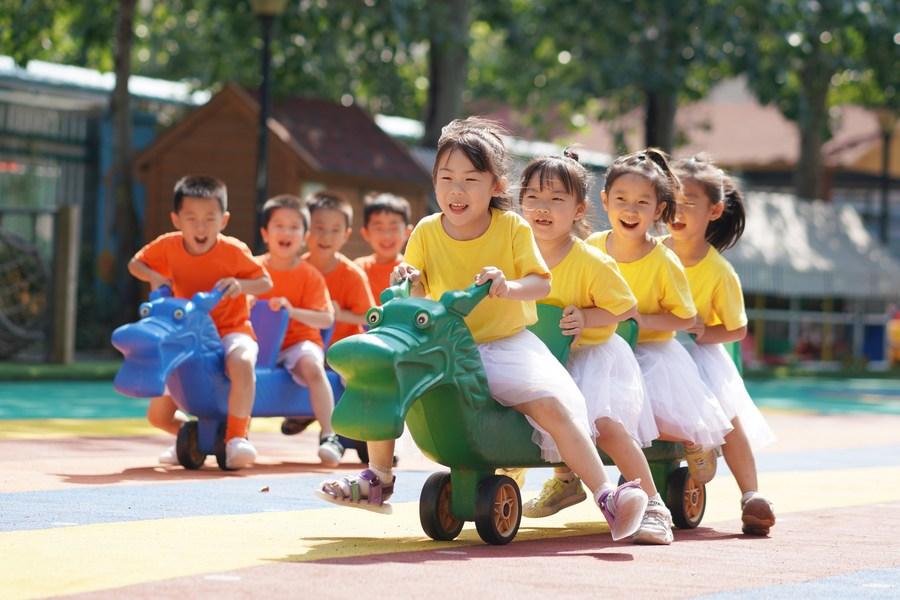Cities roll out incentives to boost birthrates
 0 Comment(s)
0 Comment(s) Print
Print E-mail China Daily, February 27, 2023
E-mail China Daily, February 27, 2023

Children take part in a racing game at a kindergarten in Neiqiu County of Xingtai, north China's Hebei Province, June 10, 2021. [Photo/Xinhua]
Major cities have ramped up subsidies and nursery care services to encourage families to have more children as senior health officials said "bold and innovative" measures should be taken to address low birthrates.
Hangzhou, capital of Zhejiang province, recently announced that parents who have a third child will receive a lump-sum payment of 20,000 yuan ($2,905) and those who have a second child will get 5,000 yuan.
Officials in Shenzhen, the financial and technology hub of Guangdong province, said in January that parents who have a third child will receive a subsidy of 19,000 yuan.
According to a document issued by the city authorities, a couple will receive a subsidy of 7,500 yuan for their first child and 11,000 yuan for their second. The subsidies will be paid in annual installments until the child turns 5.
Jinan, capital of Shandong province, announced in January that all families that have a second or third child will receive a subsidy of 600 yuan per month per child until the child turns 3.
Yang Ge, a researcher at Chinese Academy of Social Sciences' Institute of Population and Labor Economics, said that fertility subsidies will likely be an incentive for low-income groups to have more children, but will hardly affect middle- and high-income families.
"It will be difficult to align specific measures aimed at encouraging births across the country, so local governments, especially those that want to put extra efforts into raising the population and have extra finances, can take the lead in rolling out cash incentives," she said.
Yang added that another popular approach used by many local authorities to encourage births is the expansion of nursery care services. "Due to the relatively high female labor participation rate in China, helping women of childbearing age to better allocate their time will have an impact on their fertility plans," she said.
Officials in Shenyang, capital of Liaoning province, said that affordable nursery care centers can receive up to 365 yuan per child per month in subsidies, while kindergartens are being encouraged to provide nursery care services for children ages 2 and 3. In addition, employers will be supported in setting up nursery care facilities near workplaces.
However, Yang said that raising the fertility rate is not easy based on the experiences of developed countries, and it might take at least a decade for supportive measures to yield outcomes.
The mainland's total population dropped for the first time in six decades last year. The number of newborns also fell below 10 million for the first time since 1950, according to official statistics.
Yang Wenzhuang, head of the National Health Commission's department of population surveillance and family development, said the total fertility rate in China had dropped from 1.77 births per woman in 2016 to 1.15 in 2021.
"The extremely low rate of fertility is the most prominent threat to maintaining balanced population development," he said in an article published last month.
Yang said the fertility rate in some European countries fell below 1.5 before policymakers began rolling out supportive measures to increase birthrates. It took about a decade before a slow rebound in birthrates began.
"Japan and South Korea have been recording consistently low fertility levels because their interventions were rolled out belatedly and efforts to address the issue were lackluster," he said.
For China, Yang said that financial burdens, challenges in taking care of children and women's concerns over career development are major factors contributing to low birthrates.
"In essence, their concerns are that the costs of having and rearing children are too high," he said, adding that comprehensive measures that can precisely tackle public concerns must be launched.
"Local governments should be encouraged to actively explore and make bold innovations in reducing the cost of childbirth, child care and education," he added.






Go to Forum >>0 Comment(s)